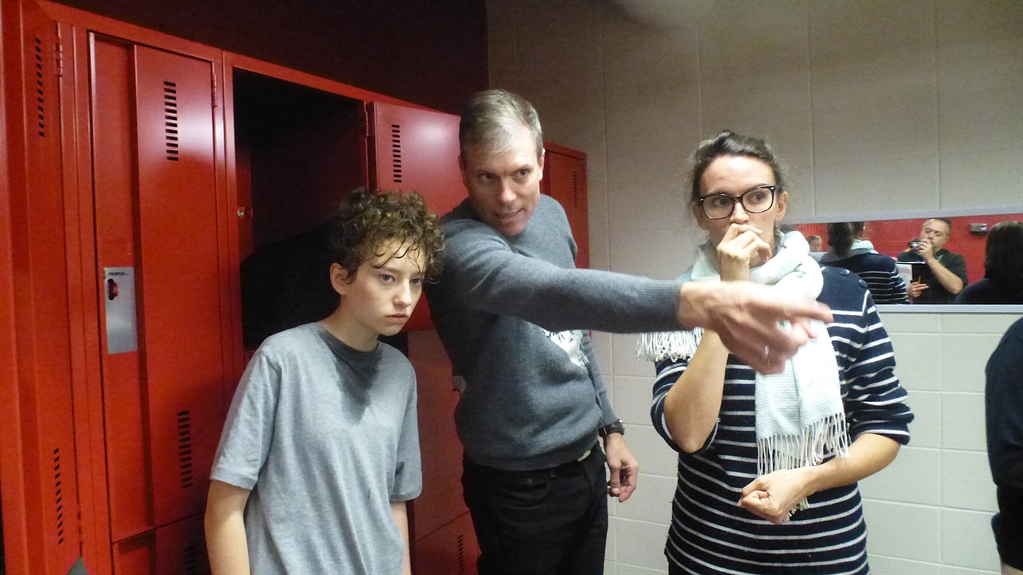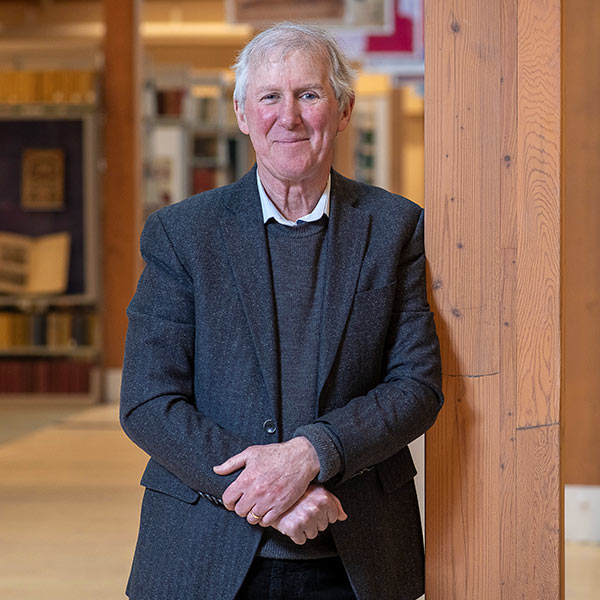“Allo, Bébé? I’m sorry, I really have to take this call,” says movie producer and Metafilms founder Nancy Grant, BA’05. “Bébé,” it turns out, is filmmaker Xavier Dolan, whose latest work, Mathias et Maxime, is in official competition at the 2019 Cannes Film Festival.
“We have to decide how many days we’ll be spending at Cannes, which days we’ll go and who will go. It’s complicated,” explains Grant after the call. Her phone almost never stops ringing: Metafilms has another movie, Monia Chokri’s La femme de mon frère, in competition at Cannes (Chokri’s movie went on to win the festival’s Coup de Coeur award).
Grant’s name is practically inseparable from Dolan’s – the close collaborators have worked together on all five of his most recent features. In 2013, Grant gave Dolan the green light to start work on Mommy even though she had only secured a third of the film’s budget at the time. The gamble paid off: Mommy went on to win the 2014 Prix du Jury at Cannes. Two years later, she and Dolan marched up the stairs of Cannes’ Palais des Festivals for a second time when Dolan’s Juste la fin du monde won the Grand Prix.
Quebec cinema has established itself as a force to be reckoned with, receiving recognition at the Oscars and Césars. During the recent Canadian Screen Awards, it was hard not to notice that 14 of the 15 finalists in the categories for best film, best director and best original screenplay were all from Quebec.
Several McGill graduates are making names for themselves in the Quebec film industry. Philippe Lesage, BA’98, for instance, directed Genesis, which earned three Canadian Screen Award nominations, including best film.
“The years I studied French literature [at McGill] were decisive. They gave me the confidence to write,” says Lesage. He describes the time he spent in classes taught by emeritus professor of French language and literature Yvon Rivard as “a real privilege. We had to turn out one short story per week. Yvon, who became a friend, was the first person to recognize I had some talent.”
Alexandre Franchi, BCom’92, worked in banking for six years before becoming a director. “I came into the game late, so I had to act quickly,” he says. Before veering into feature films, he first established himself as a successful director for TV commercials (his clients have included Pepsi and Toyota). “Thanks to my [McGill management courses], I knew what the advertisers wanted,” says Franchi.
His two feature length films, The Wild Hunt (it won the Toronto International Film Festival’s prize for best first feature by a Canadian director) and Happy Face, have both received wide exposure on the festival circuit.
As a McGill student in the mid-nineties, Daniel Ferguson studied history and religious studies – which seems apt for a director who went on to make the internationally successful Imax films Journey to Mecca and Jerusalem. Ferguson gives the Students’ Society of McGill University (SSMU) some of the credit for his career.
“When I came to McGill I was disappointed to discover that the McGill Film Society had been shut down because of an accumulated debt. [SSMU] told me: ‘If you start a new association with another name and a new constitution, we’ll give you the old equipment.’ So I created a new association called Image ensemble, sold the old equipment to pay off the debt and bought new equipment.
“Image ensemble turned into a little film school where members could make a film, so out of necessity, I became a producer. I took care of all the equipment issues and got grants and donations from film industry personalities like Jake Eberts [BEng’62, DLitt’98]. It worked so well, I had a hard time finishing my degree.”
Ferguson grew up in Ontario and Australia, but was attracted to Quebec by the vitality of its film industry. “I was fascinated by films like Jésus de Montréal, Un zoo la nuit, and Léolo,” he explains. “Quebec cinema seemed to be way ahead of the rest of Canada, and I think that’s still true.”
With Quebec directors like Dolan, Jean-Marc Vallée (Sharp Objects) and Denis Villeneuve (Blade Runner 2049) all enjoying international acclaim, Ferguson isn’t alone in thinking that way. So why is Quebec – and Montreal in particular – such a vibrant place for making movies?
There are several factors worth considering: affordable rents that encourage a bohemian arts community; a substantial pool of talent thanks to a bustling theatre scene and a large (relative to the size of the population) TV industry; access to training (Concordia, UQAM, Institut national de l’image et du son).
And then there’s the Société des entreprises culturelles (SODEC). Thanks to this government agency, Quebec is the only province that doubles the grants received from Telefilm Canada. What’s more, Quebec offers generous tax credits to the film industry.
“In the United States, producers and financiers can demand changes,” says Lesage. “But here, directors participate in the final edits and have the last word. It encourages ‘auteur’ films.”
“Quebeckers want to see and hear their own stars and they celebrate the success of their artists everywhere, even in other languages,” says director David Uloth, BSc’94.
Uloth’s film Dérive, a recent commercial and critical success, benefitted from Quebec’s potent home-grown star system. One of his actors, Mélissa Désormeaux-Poulin, shot to stardom in 2011 after appearing in the Oscar-nominated Incendies.

“She’s a true celebrity, very talented, and she brought her network to us. I didn’t realize what that can do, even for an art film,” says Uloth.
“The definition of success for me was being able to making a living from my work without having to do other jobs on the side,” says Chloé Cinq-Mars, MA’00. Uloth’s partner, professionally and romantically, she wrote the script for Dérive. “No one makes a film for the money. We do it because we don’t have any choice. It’s a need, an urge. It’s almost therapeutic.”
While Lesage’s Genesis received rave reviews inside and outside the province (The Globe and Mail called it “one of the best films of the year – no matter its country”), he says his start in filmmaking was rocky.
He returned to Quebec in 2001 after studying at Denmark’s European Film College. “I went knocking on doors and all producers had to say was, ‘What were you doing in Denmark?’” It would take Lesage more than a decade to gain recognition: his documentary Ce coeur qui bat won a Jutra prize in 2012.
Uloth worked for five years as a camera crane operator on the sets of big American productions filming in Montreal. He’d spend his days in the company of Martin Scorsese and Leonardo DiCaprio, and evenings and weekends working on his own projects.
“In 2004, I won one of the screenwriting awards at the Berlin International Film Festival. As a prize, they gave me enough resources to direct my short film, The Pick-up. My grant applications started being successful after that.”
Quebec might nurture its film industry more than in other places, but that doesn’t mean the province’s filmmakers are traveling an easy road.
“The market in Quebec is so small that a film absolutely must find other publics to be viable and gain recognition,” says Grant. She adds that the economics of filmmaking are shifting in an era of Netflix and other streaming services.
“Distributors finance us on the basis of anticipated sales, whether it’s box office or DVDs. Because they are making less money from these sources, they are more hesitant about investing.”
“After each film, there’s no guarantee things will work again,” says Uloth. “Even though Denys Arcand’s films won awards at Cannes and at the Oscars, he had to start from zero with his next film.”
by Jean-Benoît Nadeau, BA’92
translation by Julie Barlow, BA’91
published in June 2019


